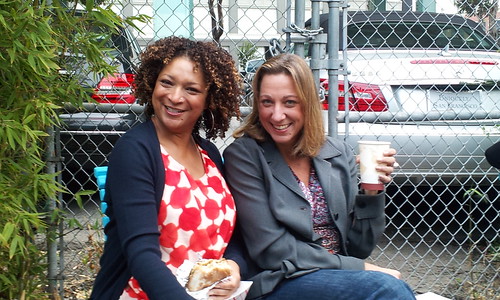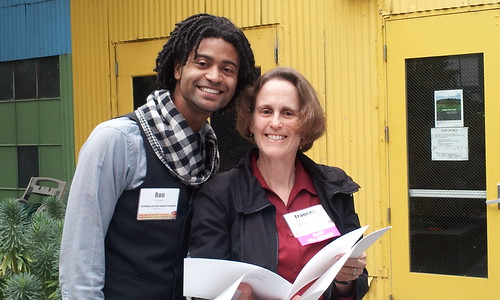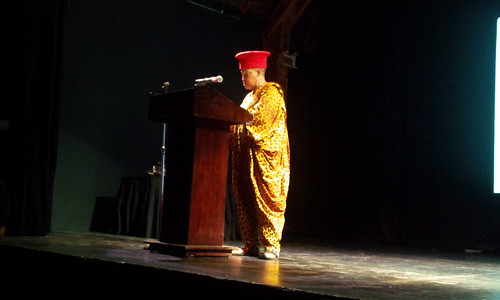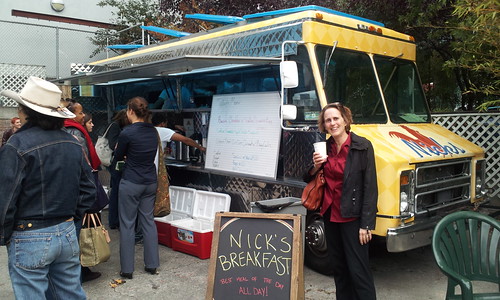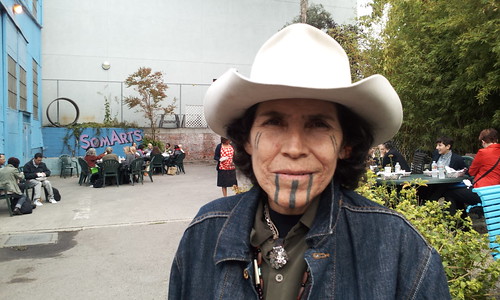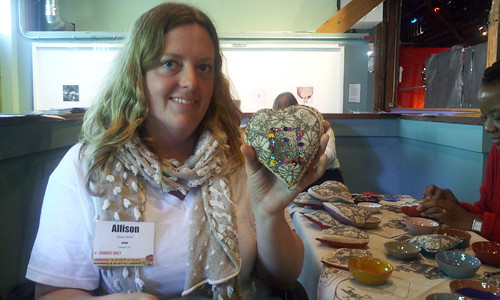Individual Artists, Social Justice and Fabulous Food Trucks: Preconference People and Their Stories
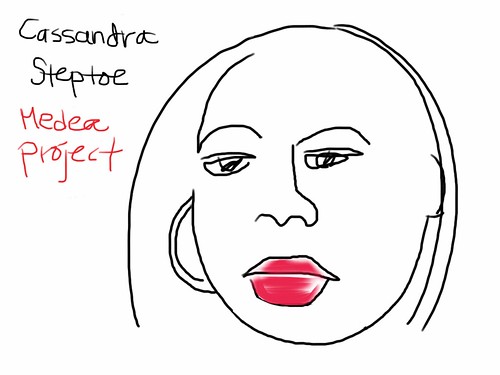
Rhodessa Jones, how should I begin?
Yes you are a performing artist, writer & director, founder and artistic director of The Medea Project: Theater for Incarcerated Women – is everyone following me? Stay with the tour, people.
The Individual Artists & Social Justice Preconference
I am really honored to be one of the bloggers at this year’s Grantmakers in the Arts 2011 Conference in San Francisco. Here is some great stuff I took away from the Saturday preconference.
Maurine Knighton and Lynn Stern
We spent the day at SOMArts getting into a single question: How are artists changing the world?
Ron Ragin and Frances Phillips
Rhodessa had us cooing like pigeons, insisting, “Nobody told her” like a restless Greek chorus as she folded that question into poetry, quotes and stories.
“The team is everything” Lionel Ritchie
“The Creator has a plan” John Coltrane
Rhodessa Jones
Rhodessa says the job of an artist is to introduce different communities to each other, such as incarcerated, HIV positive women and theatre. She changes the world through the theatre of everyday tragedies and unexpected glories such as Cassandra Steptoe, an HIV positive woman who not only is surviving, she is thriving. She is the story of a woman whose life was transformed through the crucible of theatre into a positive life force and more importantly, a way for others like her to achieve a full life.
Oh, by the way. Did I mention that the food trucks were awesome?
Frances in front of the breakfast truck
Jeff Chang, executive director, Stanford university Institute for Diversity in the Arts, said something very cool about waves.
He said that the waves on the south shore of Tahiti, perhaps the most beautiful in the world, are a process that begins with Antarctic storms that are a gathering force that push their way thousands of miles to Tahiti and manifest themselves as waves. So these waves are actually part of a process of visible and invisible forces.
Jeff said that culture is like the ocean. Culture is the realm of ideas, stories, identity, where public sentiment is formed. It is where people are at.
Cultural change always precedes political change. Culture is essential in the theory of change.
Artists are essential to the process of shaping public sentiment from the beginning.
This one I really like – Communication is surfing. Artists want to be makers of waves.
We believe we can move national imagination.
We can make some waves.
Favianna Rodriguez, the artist who designed the image of this year’s GIA conference, is interested in opportunities for visual artists and cultural workers to become part of the core movement, specifically in:
- Publishing
- Rapid response
- Convenings
- Education and skills
What are the ideal conditions to inspire artists?
What ideas can reshape the situation?
Art reframes the debate.
Erin Potts, executive director of Air Traffic Control, spoke of how small investments can yield great results. Taking 75 artists on a four day retreat empowered them to engage their 16.6 million Facebook friends, 2.5 million Twitter followers, and 3 million YouTube viewers to think about their world differently. For example, one band encouraged their fans to rethink carbon consumption caused by driving to their concerts and created phone apps with information about utilizing public transportation to get to the concerts.
In this session, these models of cultural strategy and cultural organizing were, at their core, all about creating support for artists, moving hearts to create art and to become waves of change.
L. Frank
“I am a decolonizationist,” says L. Frank, an artists and activist, who is a member of the Tongva/Ajachemen Nations. “Being extinct is not easy.”
She also says,
I was once a shadow of my former self
I followed my footsteps to the past but the journey was too far
I turned away failing to run but succeeding to fly
Allison Smith remarked that more and more conference were including hands-on art making experiences. She offered a workshop on trench art, inviting us to create beaded and embroidered pieces that can “bridge the gap between civilian arts and crafts people and military service people and veterans.”
She says, “It is a way to start a conversation. Crafts and textiles make visible a hidden history.”
Allison Smith
What did I learn from all this?
In the larger picture, you have artists in communities engaged in social practice. On a smaller one on one level, you have engaged personal experiences and storytelling.
About the Author: Hoong Yee Lee Krakauer writes about how to be a nimble nonprofit, make life creative and make a difference at www.hoongyee.com.
She is also the Executive Director of the Queens Council on the Arts. Hoong Yee can be found surfing in the Rockaways whenever there are waves.
Do you want to know the fears, visions of perfect worlds and world changing advice of your peers and keynote speakers? I have a special bonus post for you of interviews I conducted with people during the conference. Just leave me a comment with your email or better still, subscribe and get new style notes for people who change the world at www.hoongyee.com.

